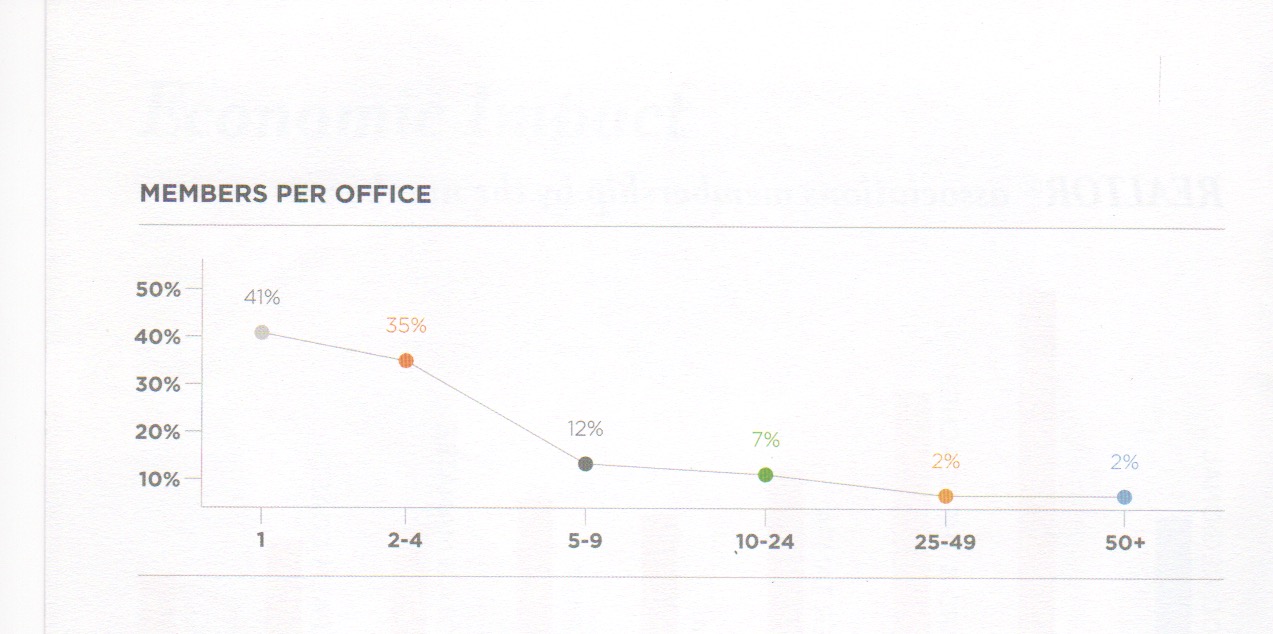How the MLS and the web transformed the real estate industry.
IS BIGGER BETTER WHEN SELLING?
Speed read …
- Its estimated that 9 out of 10 buyers begin their search for a new home on the internet,
- Property listing data is automatically sent to a myriad of real estate centric websites by the Multiple Listing Service (MLS) via syndication,
- This syndication of listing data has created parity among small and large real estate brokerage companies for web based marketing venues,
- Real estate companies come in different sizes from single person offices to those with hundreds, or even thousands of agents,
- 41 percent of Realtor member offices in the Orlando Regional Realtor Association (ORRA) are single agent offices and a full 88 percent have less than 9 agents,
- Over 80 percent of real estate transactions are co-ops between two real estate companies or between two agents within one company,
- When paired with the brokerage industry practices known as transaction sides, this parity further negates the “bigger is better” paradigm.
- When you need to sell, the size of the real estate company should not be a driving factor in your decision of which agent to hire. Experience, performance, and trust are the three most important elements in deciding on which real estate agent is best for you.
Real estate companies range in size from single agent operations to regional and nationwide mega brokerages with hundreds or even thousands of agents, but is bigger better when it comes time to sell?
Historically, real estate brokerages that had many offices (and agents) in a given market had a marketing advantage in that they could put more “eyes” on a seller’s property, not just from just their number of agents but from larger advertising budgets. Given that most agents work with numerous buyers at any given time, their agents could readily bring a seller’s property to the buyer’s attention thereby increasing showings and the probability of a sale. Before the “net”, these larger brokerages would spend lots of money on print advertising, primarily with the local Sunday paper’s real estate classified sections allowing them to build “top of mind” brand recognition while spreading the word about their office property listings. With the rise of the internet and the continuing decline of print subscriptions, those days are long gone.
ALONG CAME A SPIDER: The MLS meets the WWW.
 It’s estimated that 9 out of every 10 buyers begin their home search on-line. With real estate advertising migrating almost exclusively to online real estate centric portals, property listing data is accessible by anyone with an internet connection allowing property information to be viewed millions of times 24/7 by interested buyers around the globe.
It’s estimated that 9 out of every 10 buyers begin their home search on-line. With real estate advertising migrating almost exclusively to online real estate centric portals, property listing data is accessible by anyone with an internet connection allowing property information to be viewed millions of times 24/7 by interested buyers around the globe.
Approximately 20 years ago, property listing data migration was initiated by the local Multiple Listing Services (MLS) in keeping with their mission statements to increase services provided to their Realtor members. These “real time” data feeds provide listing information every minute of the day to hundreds of real estate centric websites, including Realtor.com, Zillow, Trulia, Yahoo Real Estate, and many more. In addition to this national syndication process, the MLS sends the same data feeds to thousands of local member brokerage websites through what is known as the Internet Data Exchange, or IDX. Like the national data feeds, the IDX data is updated approximately every five minutes, 24 four hours a day, 7 days a week and is automatically live streamed, or “pushed”, to every member’s website who participates in the IDX service (nearly all members do). The effect of which is within minutes of [your] property listing going “live” on the local MLS, it will appear in property searches performed by visitors of all local real estate broker’s search results pages as well as the national real estate advertising websites. This data migration takes place for every property listing that is posted in the MLS (unless prohibited in writing by the seller) regardless of the size of the member firm that has the property listing.
A recent report by the Orlando Regional Realtor Association (ORRA) looked at the constitution of their membership (18,223 as of December 2020) and revealed that 41 percent of their member’s offices have only one agent while another 35 percent have two to four agents. This means that a full 76 percent of ORRA member offices have four or fewer agents! Going one step up on the list shows an additional 12 percent of member offices have between 5 and 9 agents! A full 88% of member’s offices have less than 10 agents. As the 8th largest Realtor board in the nation it’s reasonable to assume that the numbers from the ORRA study are reflective of real estate brokerages across the country as most real estate brokerage companies are locally owned and operated small businesses.
 Here’s the rankings as per the ORRA report:
Here’s the rankings as per the ORRA report:
# Agents by member office percentages
- 1 agent – 41%
- 2 to 4 agents – 35%
- 5 to 9 agents – 12%
- 10 to 24 agents – 7%
- 25 to 49 agents – 2%
- 50 or more agents – 2%
If big is necessarily “better” these small independent real estate companies not only couldn’t survive they wouldn’t comprise nearly ninety percent of the Board’s membership. With these numbers as the backdrop the odds that you will use a “small” real estate company to sell your property are nearly 9 out of 10 and you won’t be alone.
 The MLS makes no distinction between a property listing submitted by a real estate firm with just one agent from a property listing submitted by a firm with 1000+ agents. In this way the MLS has created parity between small and large real estate firms relative to publishing and displaying property listings on the web. In essence a listing is a listing, is a listing, is a listing!
The MLS makes no distinction between a property listing submitted by a real estate firm with just one agent from a property listing submitted by a firm with 1000+ agents. In this way the MLS has created parity between small and large real estate firms relative to publishing and displaying property listings on the web. In essence a listing is a listing, is a listing, is a listing!
In conclusion, when it’s time to sell your property the size of the real estate company shouldn’t be what drives your selection of your real estate agent. Instead, in making that decision the word “bigger” isn’t one of the three most important words you need to focus on. Most importantly you should consider your agent by these three words: Experience, Performance, Trust.
POST SCRIPT: There’s an additional dynamic that should be included in this discussion about “big” vs “small” real estate companies namely that most of the large “branded” real estate organizations are in constant recruitment mode. Not only are they trying to on-board the more experienced and seasoned agents (from competitors) but are continually recruiting newly licensed real estate agents beginning in the real estate schools. In fact, many larger real estate brands have in-house real estate schools specifically for “recruiting” the newly licensed agents into their firms. Many of the newly licensed agents gravitate to the larger firms and use them as a mechanism for “on the job training”.
A recent report by the Orlando Regional Realtor Association revealed that nearly 1/2 of its members have less than two years of practical real estate experience. With their emphasis on continual recruiting, many of the larger firms have a higher percentage of newly licensed agents among their agency collective. You can read my post on this topic here >.
Further reading:
READY TO SELL?







